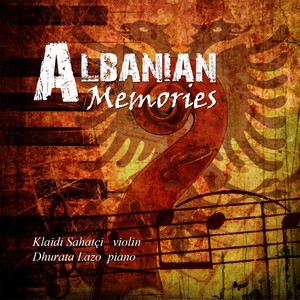
Albanian Memories
- 流派:Classical 古典
- 语种:英语
- 发行时间:2013-01-27
- 类型:录音室专辑
- 歌曲
- 时长
简介
"Albanian Memories" is the first serious attempt to introduce the Albanian past memories through the musical sound, perceived through some original musical creations of a group of Albanian composers like Pjeter Gaci, Albert Paparisto, Feim Ibrahimi, Eriona Rushiti, Cesk Zadeja, Rafet Rudi, Nikolla Zoraqi, Aleksander Peci and Thoma Simaku. The carefully selected musical pieces date back from the mid-twentieth century, until the 1990s, on the verge of the opening of Communist Albania to the west. This CD with the intriguing title "Albanian memories" becomes even more credible for the listeners as a particular sound document, as it comes through two "storytellers" of Albanian origin: Klaidi Sahatçi on the violin and Dhurata Lazo on piano.Curiosity increases even more when you think that these memories of the past come from a country like Albania, the most isolated communist country during the Cold War... And your mind goes instantly to the relationship of art under the dictatorship and to the wracking question, how could music be written in those years, a music which was able to carry not only the memories of that time, but its protagonists, too, until today?! Although in the heart of Europe, Albania historically has been seen by the Europeans as an exotic place, full of stories and legends, capable of inspiring still today's youth multidimensional fantasies. Information on music in the Illyrian-Albanian Antiquity is commonly found in the works of Homer, Aristotle, Strabo, Lucian, Plutarch, Titus Livy, Cicero, Pliny, etc.. One of this world-renowned heritage is iso-polyphony or singing with many voices, part of the "Unesco representative list of intangible heritage of Humanity" -2005, a millennial culture associated with life and death, Hades of the underworld, Achilles, the great Pan etc. W. Shakespeare (influenced by this legacy that was still standing between the two civilizations, the Greek and Roman ones), placed unseemly in Illyria the events of the comedy "The Twelfth Night", written around the years 1599-1600. The comedy gently opens to the sound of music in a hall of the palace of Illyria’s Duke Orsini, because music was at home there; Antonio Vivaldi (1677-1741) wrote the opera "Skanderbeg" (with libretto by Antonio Salvi (1664 - 1724), which premiered in 1718, in the Florence opera theater). In the center of the opera was the Albanian national hero, declared by Pope Nicholas V as "the Athlete of Christ" ... and of course Mozart, did not forget to dress two of the main characters of his opera "Cosi fan tutte", with Albanian folk costumes as works of fashion! In addition, it is indeed a rare opportunity to listen to the Albanian music for violin and piano from the hands of Klaidi Sahatçi, who plays a “Wieniawsky" 1719 violin, made by the master Antonio Stradivarius. It is this master who in a letter to the famous Medici of Florence wrote that ... "it has been a dream to make a journey in Illyria, since there exist rare trees for musical instruments, as is proven by the Illyrian instrumentalists ". We are not sure whether Stradivari had this trip in Illyria, but his violin in the masterful hands and time "pointers" of Klaidi Sahatçi, seems as already done it! Eh memories! In fact, the first thing you do when you listening this CD relates to the revaluation and re-dimensioning of what we call Albanian music and national music school. With a nearly one century long tradition, the Albanian music in general and that for violin in particular, became quite popular in Albania after the establishment in the 1950s of the first artistic music schools, where violin was studied (in Tirana, Shkodra, Korca, etc.), and the return home in the middle of the 1950s, from the former Soviet Union, of the first group of Albanian professional composers as: Cesk Zadeja, Tish Daija, Dhora Leka, Albert Paparisto, Kozma Lara, Nikolla Zoraqi, Pjeter Gaci, Tonin Harapi etc., who created the first works for violin, a part of which are in this CD. In the center of the group of composers selected from the duo Sahatçi-Lazo is undoubtedly the figure of Cesk Zadeja. He is considered the "father" of Albanian music, founder of the faculty of composition at the Higher Institute of Arts and the ideologue of the principles of Albanian composition school. This school built under the example of the national music schools in the Europe of the 19th century, relied like Antaeus on mother earth, on the Albanian folk music heritage. You will notice it in the titles of the selected music pieces (such as ballads, dances), mostly citing Albanian original folk music themes. Three generations of composers who lived and live within the territory of Albania and the Kosovo composer Rafet Rudi, who was educated in Belgrade and Paris, when Kosovo as part of the former Yugoslavia was an open country, are intertwined in this CD. However a common feature of their music for violin (within the creative individuality of every one of them), is emphasizing the beauty of Albanian-wide melody and rhythms. Such a thing is attained through the expressive means of the violin and piano, based on the standards of a music oriented around the tonality and modes, up to the limits of polytonality. Be confident that within it you will find the Albanian environment and men of all ages, simple and without ideology underfoot as the instrumental music for violin somehow avoided the ideological burden that was often reflected in the programmed symphonic and vocal music. You may enjoy it because Klaidi Sahatçi and Dhurata Lazo, as two instrumentalists of the time that is not disappoint and does not forget, enabled us to have a flashback, exactly in the years when the communist leaders used to say that Albania was "a lighting beacon in Europe"!

